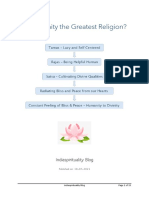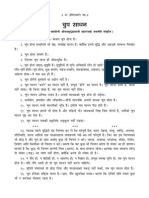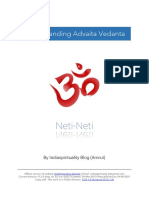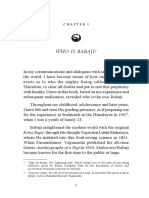100%(1)100% found this document useful (1 vote)
341 viewsGems From Guru Gita
Gems From Guru Gita
Uploaded by
Indiaspirituality AmrutThe document discusses the concept of Guru and Guru Tatva as presented in the Guru Gita scripture. It provides several passages from the Guru Gita that define Guru as being identical to Shiva and the source of supreme knowledge and happiness. It emphasizes that without understanding Guru Tatva and devotion to the Guru, spiritual practices and scriptural study will not lead to self-realization or liberation.
Copyright:
Attribution Non-Commercial (BY-NC)
Available Formats
Download as PDF, TXT or read online from Scribd
Gems From Guru Gita
Gems From Guru Gita
Uploaded by
Indiaspirituality Amrut100%(1)100% found this document useful (1 vote)
341 views14 pagesThe document discusses the concept of Guru and Guru Tatva as presented in the Guru Gita scripture. It provides several passages from the Guru Gita that define Guru as being identical to Shiva and the source of supreme knowledge and happiness. It emphasizes that without understanding Guru Tatva and devotion to the Guru, spiritual practices and scriptural study will not lead to self-realization or liberation.
Original Description:
Explanation of who is Guru, Guru Tatva, Brahman, and Qualifications of disciple from Guru Gita
Copyright
© Attribution Non-Commercial (BY-NC)
Available Formats
PDF, TXT or read online from Scribd
Share this document
Did you find this document useful?
Is this content inappropriate?
The document discusses the concept of Guru and Guru Tatva as presented in the Guru Gita scripture. It provides several passages from the Guru Gita that define Guru as being identical to Shiva and the source of supreme knowledge and happiness. It emphasizes that without understanding Guru Tatva and devotion to the Guru, spiritual practices and scriptural study will not lead to self-realization or liberation.
Copyright:
Attribution Non-Commercial (BY-NC)
Available Formats
Download as PDF, TXT or read online from Scribd
Download as pdf or txt
100%(1)100% found this document useful (1 vote)
341 views14 pagesGems From Guru Gita
Gems From Guru Gita
Uploaded by
Indiaspirituality AmrutThe document discusses the concept of Guru and Guru Tatva as presented in the Guru Gita scripture. It provides several passages from the Guru Gita that define Guru as being identical to Shiva and the source of supreme knowledge and happiness. It emphasizes that without understanding Guru Tatva and devotion to the Guru, spiritual practices and scriptural study will not lead to self-realization or liberation.
Copyright:
Attribution Non-Commercial (BY-NC)
Available Formats
Download as PDF, TXT or read online from Scribd
Download as pdf or txt
You are on page 1of 14
Guru and Guru Tatva from Guru Gita
Hari OM. On the holy occasion of Guru Poornima, 22
nd
July 2013, lets understand the
Guru and Guru Tatva as given in Guru Gita.
One has to carefully interpret Guru and Guru Tatva i.e. Brahma Tatva while reading
Guru Gita.
||Aum Tam Namami Gurum Param||
| , | | | |
| | | | ||
Who so ever has the Supreme Love & adoration for the Lord and as for the Lord,
likewise for the Guru; to him these great matters, when they told, become clear of
themselves. (17)
| ||, |
| | ||
He who is the Guru is Shiva Himself, so declare the scriptures, and the fact that
Shiva is the Guru, is reminded to us in all the Smritis. He, who makes any distinction
between the two, is guilty of the crime of uniting with his own Gurus wife. (18)
||| ||| |
||||| ||
||| | | |
| || ||| || ||
| | | | |
| ||
The Vedas, the Shastras, Puranas, the Itihasas etc., the science of Mantras, Yantras
Mohana, Uchatana etc., cults like the Shaiva, Agama, Shakta, etc., and other cults
existing in the world today are merely false theories expressed in corrupted words
which confuse the ignorant and deluded Jivas. Japa austerities, observances,
pilgrimage sacrifice, charity - all these become a mere waste without understanding
the Guru Tattva. (19, 20, 21)
| | |
|| | | | | ||
Brahman resides in the mouth of the Guru i.e.; his words, and one attains Brahman
by the grace of the Guru. One should meditate on His Guru at all times, just as a
devoted wife thinks of her husband only. (30)
Note: In this sloka, Guru is to be taken as Guru Tatva
|||| | |
|| ||
The syllable Gu is the darkness and the syllable Ru is said to be light. There is no
doubt that the Guru is indeed the Supreme Knowledge that dispels (the darkness of)
ignorance. (33)
||| || |
||| | ||
Gu Kara means the darkness and Ru Kara means the remover of the darkness.
On account of the power of removing darkness, the teacher is known by the
significant name Guru. (34)
| ||| ||| | |
|| | ||
The letter Gu denotes that He is beyond the three Gunas and Ru denotes that He
is beyond forms. Because He is free from Gunas and forms, He is called the Guru.
(35)
| | | || | |
|| |||| ||
The first syllable Gu represents the principles such as maya and the second syllable
Ru the supreme knowledge that destroys the illusions of maya. (36)
||| |
||| | ||
The holy lotus feet of the Guru shine like the two pearls (the essence) of the entire
Srutis. The Guru is the exponent of the Truths of the Vedanta. Therefore one should
worship the Guru. (39)
| | |
d | ||
By the mere remembrance of whom Knowledge dawns in one automatically; he (the
Guru) is ones entire wealth. Therefore one should worship the Guru. (40)
| |
|| | ||
When one is faced by adverse situations, only Guru helps just like the closest
brother. Guru is manifestation of all religious, therefore, prostrations to the Guru.
(42)
Note: Religion = Dharma = varNa Dharma and jAti Dharma
| | | || |
|| | ||| ||
Neither those who perform great sacrifices, nor yogis, nor those who practice severe
austerities are liberated if they are averse to Guru Tattva. (52)
| |
|| | |
||H
|| | ||
I prostrate myself before that Guru, the Bliss of Brahman, the bestower of Supreme
Happiness, who is Knowledge absolute, transcending the pairs of opposites,
expansive like the sky, the goal indicated by the great sayings like Thou art That,
the one eternal, pure, unchanging, the witness of functions of the intellect, who is
above all Bhavas (mental conditions) and the three Gunas (Sattva, Rajas and
Tamas). (54)
| @ | |
s || ||
One should purify his mind by the method prescribed by the Guru. With the
knowledge of the Self, one should reject everything else as unreal. (55)
| || |
| d| | | | ||
What is the use of elaborating here? Without Gurus infinite grace peace of mind is
difficult even after studying millions of scriptures. (56)
|| U| || | |
| || ||
One who cuts as under, for the disciple, the eight kinds of attachment (doubts, pity,
fear, shyness, censure, position in society, high birth and wealth), by the sword of
mercy and bestows absolute Bliss is called Satguru. (57)
|| | |
| | || || | ||
The Guru is one who instructs the disciple about attributeless, eternal Brahman, and
there by reveals the Brahmanbhava (feeling of being Brahman) in his heart just like
one lamp kindles another lamp is the Guru. (75)
| ||||H| |
| || ||
By steadiness in the path to liberation, by seeing ones own Self in oneself, by the
practice of introspection within and by the Grace of the Guru, the Knowledge of the
Self dawns in the Sadhaka. (76)
|| | | |
| || | ||
By constant meditation on the Guru, the individual soul becomes Brahman, wherever
he lives he is free, there is no doubt in it. (85)
| | | | |
| | | ||
My dear Parvati, Guru possesses the six qualities of knowledge, dispassion,
lordliness, fame, wealth and sweet-eloquence. (86)
| | || |
|| || | ||
Guru is Shiva, Guru is God. Guru is the relative of all embodied beings. Guru is the
Self. Guru is Jiva. There is nothing other than the Guru. (87)
| || |
|| ||
As the Rajasic Brahma, SriGuru creates this universe, as the Sattvic Vishnu, He
protects it and as the Tamasic Rudra, He destroys it. (96)
|| | |
|| | | | ||
By His grace, after having attained a glimpse of that Supreme being in Guru, one
should stay alone, free from all contacts without any attachment and peacefully. (97)
|| | s| | |
|| || | | | ||
O beloved Parvati, one might have learned the four vedas and the six- branched
Agamas (shiksha, kalpa, Vyakaranam, Nirukta, Astrology and Chhandas) all
Adhyatma Shastras, but one cannot attain Self-knowledge without Guru. (100)
|| | ||| |
|d ||
One may be engaged in worship of either Shiva or Vishnu, but if he is without
knowledge of the Guru-Tattva, all his worship is a mere waste. (101)
| |H|| |
|||| | | ||
By the glory of Guru Diksha, all your actions bear fruit. By the attainment of a Guru
one attains everything. One without a Guru is mere fool. (102)
| || | |
| ||
The body, the senses, the mothers clan, the fathers clan, - all those are present in
ones guru. There is not the least doubt about this. (153)
| | | | |
| | | | ||
Guru is God. Guru is religion. The greatest penance is unshakable faith in God. I
repeat this thrice with force that there is nothing greater than the Guru. (154)
| || |
| ||| ||
GuruBhakti is the greatest kind of pilgrimage. Others are worthless. All places of
pilgrimage are present, O Devi, at the sacred holy feet of the Guru. (159)
| d||| |
d|| ||
There are ever so many Gurus in the world who rob the wealth of their disciples. But
I consider that Guru a rare one among Gurus who removes the afflictions of the
disciples heart. (162)
||| ||| |
| | ||
He who is the clever, the discriminative, the knower of the truths of spiritual
sciences, the pure, is really the Guru. His Gurutva (state of a Guru) shines. (163)
| | || || | |
||| ||| | ||
Gurus are those who are pure at heart, calm, collected, of a saintly nature, who
speaks measured words, who are free from lust, greed etc. who have conquered
their senses and who are established in good conduct (Sadacharas). (164)
|| || | | |
| | ||
A Param Guru is free from attachment, etc; peaceful, always contented in Himself,
independent, and one who considers the status of Brahma and Vishnu like a blade of
grass. (180)
| | | |
s||| | ||
One who is independent at all times and places, who possess an unshakable mind
and always blissful, who experiences the homogenous essence of the Self, such a
one is the Param Guru. (181)
| ||| |
||Ud| | ||
One who is free from the feeling of duality and non-duality, who shines by the light
of His self-realization, who is able to destroy the deep darkness of ignorance, and is
omniscient, He is a Param Guru. (182)
| | | |
| | | ||
By whose mere Darshan (look with devotion), one attains calmness, cheerfulness,
and peace and steadfastness, and peace of mind, such a one is Param Guru. (183)
| | || |
|| | ||
One who looks upon his own body as a corpse, and his Self as the non-dual
Brahman, and who has killed the infatuation for wealth and women, such a person is
a Param Guru. (184)
|| || | |U | |
|| || | ||
|| |||d|H |
|| Ud| | ||
O dear Parvati, listen to me. There are two classes of knowers of Truth. They are (1)
The Mauni, and (2) The Vakta. No benefit accrues from the Mauni to any person.
(185)
The Vakta on the other hand, is capable of saving others from great whirlpool of
Samsara. Because he is able to clear all doubts by his knowledge of the scriptures,
logical and convincing arguments and by his own direct Self-realization experience.
(186)
|| || |
|| | | ||
By the Japa of the Gurus name, O Devi, the sins accumulated in the countless lives
are destroyed. There is not the least doubt about this. (187)
| | |
| || | | || ||
By the devotion practiced towards the Guru, one attains the liberation even without
knowledge. For those who practice unflinching devotion to the Guru, no other
sadhana is required. (212)
Note: Here it has to be taken as Guru Tatva
| || | |
| ||
It is by the Gurus grace and blessings that Brahma, Vishnu and Shiva become
capable of performing their respective duties- creation, preservation, and dissolution.
(213)
| H |
||| | ||
O Devi, the two-lettered word Guru is the king among all mantras. It is the essence
of the Vedas, Smritis and Puranas. (214)
|| | | |
| d | ||
The Guru is not different from the conscious Self. Without doubt, this is the truth;
therefore wise men should make an effort to seek knowledge of Atman from Him.
(22)
|| || || |
| | ||
The hidden ignorance, absence of the Knowledge of Self, the world- Maya, the body
are all caused by ignorance (Ajnana). By whose grace one attains direct Knowledge
of the Self- he is known by the name Guru. (23)
||| || |
||| | ||
Gu Kara means the darkness and Ru Kara means the remover of the darkness.
On account of the power of removing darkness, the teacher is known by the
significant name Guru. (34)
| ||| ||| | |
|| | ||
The letter Gu denotes that He is beyond the three Gunas and Ru denotes that He
is beyond forms. Because He is free from Gunas and forms, He is called the Guru.
(35)
Brahman in Guru Gita
9 9| || |
|||| | ||
Just as a crystal shines with all its beauty in a crystal, as a mirror in a mirror, so also
in the Self shines the bliss of the Chidakasha That I am is beyond all doubts. (77)
|| || |
|||| || ||
I am unborn. I am deathless. I am beginningless. I am endless. I am changeless. I
am consciousness and Bliss. I am the smallest of the small. I am the greatest of the
great. (79)
|| |
||| ||
| | | |
|||||| ||
There is none prior to me and none later. I am eternal. I am self-illumined. I am
diseaseless. I am ever pure. I am the eternal Akasha. I am without the least
movement, am Bliss imperishable. (80)
O Parvati, Brahman is the unseen incomprehensible, without name and form and
inexpressible by word or speech directly. This is the very nature of the Brahman.
Know it thus. (81)
|| | |
||||| ||
Just as fragrance is inherent and natural camphor, flowers, etc. just as heat and cold
are natural with fire and ice, so also in Brahman eternity is natural. (82)
|| s| |
| | ||
Just as gold exists in its own nature in ornaments like ear-ring, bangles etc; so also I
am everpermanent. (83)
|||| |
|| || || ||
Just as a worm by the constant thought of a black bee ultimately becomes black bee
itself, so also, one should by constant meditation practiced on Brahman anywhere,
become Brahman. (84)
|| ||| |
|| |||| ||
Alone (one without a second); desireless peaceful, free from worry, jealousy etc. one
who shines like a child (in his simplicity) is Brahmajnani (Knower of Brahman). (88)
|| || |
|||| ||
Having drunk Brahmarasa and satisfied in the Supreme Self, the sages of realization
consider Indra also poor and then what is one to say of kings of the world? (92)
| |
||||H|H ||
The seekers after liberation should at all times develop Guru-Bhakti because by
following the path shown by the Guru, one attains the highest emancipation. (93)
||| | ||
|| | ||
|||U |
| H| ||
On the advice of the Guru, if one meditates with firm determination on the principle
of I am one without duality need not resort to forest for penances, and the
constant practice of the above principle brings about samadhi and his sins are burnt
instantaneously. (94 & 95)
| || |
| ||| ||
The jiva, which becomes omnipresent, ever-peaceful, lives happily anywhere, who is
ever in Bliss is known as omniscient. (98)
||H| H| |
||||| ||
The Jivatma (individual being) and the Paramatma (Supreme Self) are one and
inseparable just as the water and the ocean, the milk and the milk, the ghee and the
ghee or pot ether and Mahakasha (wide ether). (155)
|| ||| |
|| | ||
In the very same way, the realized soul is merged in the highest Self, day and night,
wherever he is. The realized beings delight in this identity (with Supreme Being).
(156)
| ||||| |
|||| || ||
The Jnani remains in peace and enjoys the equanimity, be it day or night. Thus the
Maha Mauni or Self realized saint acquires the state of equanimity in all three worlds.
(158)
||| |
||||| ||
O Devi, hear the truth when one is endowed with dispassion, the srutis say that he is
a properly qualified student. (177)
| |
|| | ||
Without the Knowledge of the Self whatever Sadhana is done is fruitless. O Devi,
penances,japas, etc., everything becomes like the prattling of a child. (190)
Qualifications of Shishya in Guru Gita
| || |
| ||
Abandoning thoughts of your stage in life, your caste, your reputation and increasing
your well-being and think of nothing other than the Guru. (31)
|| | |
| 9 || || ||
The Knowledge of Brahman resides in the mouth of the Guru. The disciples get it by
devotion to the Guru. In the three worlds this fact is clearly enunciated by Divine
Sages, the Pitris (ancestors) and learned men. (32)
The Sadhaka should present to the Guru seats, bedding, carriage, vehicles,
ornaments, etc., conductive to his happiness. (37)
The body, the senses, the Prana, wealth, ones own relations, the self, wife etc., all
these should be surrendered to the Satguru. (38)
U | |
H| ||| ||
All knots of the heart are rent asunder, all doubts are cleared, all the karmas are
destroyed by the grace and mercy of the Guru,O Parvati. (193)
|| || |
||||| ||
A Guru-Bhakta (one devoted to the Guru) becomes free from all capital sins, by the
practice of devotion to the Guru according to the injunctions of the scriptures. (194)
| |
d |H|| ||
One who has abandoned the company of sinners and sinful acts, whose heart is free
from sins, to him is Guru Diksha ordained. (195)
d|| |
||||H| | ||
One whose heart is fixed in renunciation, who is free from anger and pride, who has
abandoned the feelings of duality, to such a one Diksha is ordained. (196)
H |
||H|| ||
One whose life is endowed with these characteristics, who is interested in the welfare
of all beings of the world, whose life is pure and untained, to him is Diksha ordained.
(197)
d@| |
|| | ||
O Parvati, this truth should be revealed to one who is endowed with intense devotion
and faith towards the Guru, whose heart is pure to the greatest degree. It gives me
the greatest satisfaction and joy. (198)
||d@| |
|||| ||
To the intelligent one possessing purity of heart, to one in whom good actions are
fructifying, only to that qualified Sadhaka this Guru Gita should be imparted, even
with great effort. (199)
|| |
||||U| ||
By whose grace that one realizes I am everything, everything is superimposed in
me, I offer my salutations and worship to my self-realised Satgurus lotus feet. (215)
|| || |
||| | | ||
O Lord, by the gift of the light of knowledge, may Thy blessings be bestowed on me,
whose eyes are covered by the cataracts of ignorance, and whose mind is captured
by sense pleasure. (216)
You might also like
- !nectar Drops - Sri Annamalai Swami The Diary of Sri Satguru Annamalai SwamigalDocument126 pages!nectar Drops - Sri Annamalai Swami The Diary of Sri Satguru Annamalai SwamigalJoão Rocha de LimaNo ratings yet
- Amritanubhava PDFDocument290 pagesAmritanubhava PDFNitin Kalapure50% (2)
- SIVANANDALAHARIDocument139 pagesSIVANANDALAHARINagesh PrabhuNo ratings yet
- Ganesa Atharva Seersha UpanishadDocument5 pagesGanesa Atharva Seersha Upanishadveekayg3651No ratings yet
- Hinduism Basics - Traditional Overview of Sanatan DharmaDocument320 pagesHinduism Basics - Traditional Overview of Sanatan DharmaIndiaspirituality Amrut100% (1)
- Kapila Gita Full (English Only)Document8 pagesKapila Gita Full (English Only)Indiaspirituality AmrutNo ratings yet
- Panchdev Atharvashirsha Sangrah Gita Press Sanskrit HindiDocument34 pagesPanchdev Atharvashirsha Sangrah Gita Press Sanskrit HindiIndiaspirituality Amrut87% (31)
- Sri Guru StotramDocument9 pagesSri Guru StotramTaoshobuddha100% (1)
- Sri Guru GitaDocument21 pagesSri Guru GitaSachin TewatiaNo ratings yet
- Dada Vaswani SpeechDocument15 pagesDada Vaswani SpeechTheresa WestNo ratings yet
- Kaivalya Navaneeta The Cream of EmancipationDocument6 pagesKaivalya Navaneeta The Cream of EmancipationSrinivasan SiddhamoorthyNo ratings yet
- Swami Ishwarananada Gita Talks-Sessions1-7Document135 pagesSwami Ishwarananada Gita Talks-Sessions1-7HimalayanWisdom100% (1)
- Devikalottaram - Jnanachara Vichara Padalam - The Knowledge That Transcends Time Revealed To DeviDocument30 pagesDevikalottaram - Jnanachara Vichara Padalam - The Knowledge That Transcends Time Revealed To Devideepaksubsmani@yahoo.com100% (3)
- Aise Gur Ko Bal Bal JayiyeDocument1 pageAise Gur Ko Bal Bal JayiyeManoj SharmaNo ratings yet
- Meditation and Japa-Holy MotherDocument6 pagesMeditation and Japa-Holy MotherAnaNo ratings yet
- Amritabindupanishad - Translated by Swami MadhavanandaDocument3 pagesAmritabindupanishad - Translated by Swami Madhavanandaapi-19985927No ratings yet
- Bogar The SagaDocument4 pagesBogar The SagaDulqarNo ratings yet
- Sadhana Panchakam - 40 Instructions - SatyavedismDocument7 pagesSadhana Panchakam - 40 Instructions - SatyavedismPrashantNo ratings yet
- Ashtavakra Gita PDFDocument22 pagesAshtavakra Gita PDFHirenNo ratings yet
- Sai BabaDocument109 pagesSai BabamarutibabaNo ratings yet
- Advaya Taraka UpanishadDocument7 pagesAdvaya Taraka UpanishadThirunavukkarasu SivasubramaniamNo ratings yet
- A Rupas Shivoham ShivohamDocument3 pagesA Rupas Shivoham ShivohamvaidnehaNo ratings yet
- Durga Pancharatnam by Sri Kanchi Chandrashekhara Saraswati Swamigal (Kanchi Paramacharya) Source & CreditsDocument4 pagesDurga Pancharatnam by Sri Kanchi Chandrashekhara Saraswati Swamigal (Kanchi Paramacharya) Source & Creditsr_sendhilNo ratings yet
- Purusha Suktam-2Document17 pagesPurusha Suktam-2ajnaathanNo ratings yet
- PattinatharDocument11 pagesPattinatharapi-3798291No ratings yet
- Guru Paduka StotramDocument2 pagesGuru Paduka StotramRamakrishna KondapalliNo ratings yet
- Peace PrayerDocument3 pagesPeace PrayerNarayanan MuthuswamyNo ratings yet
- Hanuman Sadhanas: Important Rules For This SadhanaDocument6 pagesHanuman Sadhanas: Important Rules For This SadhanamalikNo ratings yet
- Notes - Shiv SamhitaDocument7 pagesNotes - Shiv Samhitaavinash008jha6735No ratings yet
- Dialogue Between Uddalaka and SvetaketuDocument5 pagesDialogue Between Uddalaka and Svetaketuanon_294330152No ratings yet
- Adi Shankaracharya - Saundarya Lahari PDFDocument35 pagesAdi Shankaracharya - Saundarya Lahari PDFsssbulbul67% (3)
- Yoga Vasistha 1Document58 pagesYoga Vasistha 1Tagenarine SinghNo ratings yet
- रघुवंशे प्रथमो सर्गDocument58 pagesरघुवंशे प्रथमो सर्गShubha GovindarajanNo ratings yet
- Truth Speaks - Sample Verses From Sivavakkiyam, Tamil Siddha PoetryDocument17 pagesTruth Speaks - Sample Verses From Sivavakkiyam, Tamil Siddha PoetryGeetha Anand100% (1)
- Garland of Letters Varna Mala Studies in Mantra Shastra John Woodroffe 1955Document408 pagesGarland of Letters Varna Mala Studies in Mantra Shastra John Woodroffe 1955MagisterNo ratings yet
- Gayatri BookDocument18 pagesGayatri BookRajeev SarupNo ratings yet
- Important MantrasDocument3 pagesImportant MantrasdushyantkparNo ratings yet
- Sri Kamala Ashtottara Satanama StotramDocument4 pagesSri Kamala Ashtottara Satanama StotramRavi MehraNo ratings yet
- Education in The Vision of Swami VivekanandaDocument20 pagesEducation in The Vision of Swami VivekanandaVivek Singh100% (1)
- Kirata Varahi StotramDocument5 pagesKirata Varahi Stotramsmiles789No ratings yet
- 4 Sampradayas by Purusatraya SwamiDocument111 pages4 Sampradayas by Purusatraya SwamiyadogopalNo ratings yet
- Sri Mayavada-Sata-DushaniDocument11 pagesSri Mayavada-Sata-DushaniDavor VeseljkoNo ratings yet
- Vedanta Sandesh - June 2016Document24 pagesVedanta Sandesh - June 2016Swami AtmanandaNo ratings yet
- The Idea of God in Saiva SiddhantaDocument29 pagesThe Idea of God in Saiva SiddhantaSivason100% (2)
- Quotes From Subhaashita Trishatee of Raja BhartrihariDocument16 pagesQuotes From Subhaashita Trishatee of Raja BhartrihariShawn SriramNo ratings yet
- Agattiyar Jnanam - 2Document7 pagesAgattiyar Jnanam - 2Siva VakkiyamNo ratings yet
- Guru Gita: The Song of The GuruDocument19 pagesGuru Gita: The Song of The GuruParth WankhedeNo ratings yet
- Devi MahatmyamDocument13 pagesDevi Mahatmyamsundeepmv5483100% (2)
- AmritaBindu UpanishadDocument6 pagesAmritaBindu UpanishadhkarakotiNo ratings yet
- AJAPA Japa MeditationDocument15 pagesAJAPA Japa Meditationvin DVCNo ratings yet
- Devotional Songs PDFDocument308 pagesDevotional Songs PDFpatri_er50% (2)
- Koil - Olugu Account of Srirangam DisputesDocument3 pagesKoil - Olugu Account of Srirangam DisputesramanujamuniNo ratings yet
- Bhajans On ShivabalayogiDocument6 pagesBhajans On ShivabalayogiRayBoyd100% (1)
- Om Chanting: Om Chanting Meditation for Wellness, Balance, and Enlightenment: Religion and SpiritualityFrom EverandOm Chanting: Om Chanting Meditation for Wellness, Balance, and Enlightenment: Religion and SpiritualityNo ratings yet
- Is Humanity The Greatest Religion - Indiaspirituality BlogDocument15 pagesIs Humanity The Greatest Religion - Indiaspirituality BlogIndiaspirituality AmrutNo ratings yet
- Introduction of Madhusūdana Sarasvatī's Gū Ārtha Dīpikā, A Unique Commentary On Bhagavad GītāDocument7 pagesIntroduction of Madhusūdana Sarasvatī's Gū Ārtha Dīpikā, A Unique Commentary On Bhagavad GītāIndiaspirituality AmrutNo ratings yet
- How To Find A Guru - Indiaspirituality BlogDocument4 pagesHow To Find A Guru - Indiaspirituality BlogIndiaspirituality Amrut100% (2)
- Vedanta Paribhasa of Dharmaraja Adhvarindra - Swami Madhavananda (Sanskrit-English)Document268 pagesVedanta Paribhasa of Dharmaraja Adhvarindra - Swami Madhavananda (Sanskrit-English)Indiaspirituality Amrut100% (3)
- Chup Sadhan - Quotes of Swami Ramsukhdas Ji Maharaj in HindiDocument4 pagesChup Sadhan - Quotes of Swami Ramsukhdas Ji Maharaj in HindiIndiaspirituality Amrut100% (2)
- Understanding Advaita VedantaDocument667 pagesUnderstanding Advaita VedantaIndiaspirituality Amrut60% (5)
- Guru and Guru Tatva From Guru GitaDocument8 pagesGuru and Guru Tatva From Guru GitaIndiaspirituality AmrutNo ratings yet
- ChakrasDocument37 pagesChakrasIndiaspirituality Amrut100% (1)
- WWW MLBD Com BookDecription Aspx Id 15431Document7 pagesWWW MLBD Com BookDecription Aspx Id 15431MayurNo ratings yet
- Ma 1 Sem Philosophy Epistemology (Indian) 7206 Summer 2019Document3 pagesMa 1 Sem Philosophy Epistemology (Indian) 7206 Summer 2019Aakanksha SawaithulNo ratings yet
- Yoga Styles or Yoga Paths or Types of YogaDocument3 pagesYoga Styles or Yoga Paths or Types of Yogadhanan09co28No ratings yet
- Annamalai Swami Meditation QuotesDocument4 pagesAnnamalai Swami Meditation QuotesLXNDR1100% (1)
- Kriya Yoga LineageDocument8 pagesKriya Yoga LineageLearn Kriya100% (1)
- Bhushana SaraDocument14 pagesBhushana SaraSisya MBNo ratings yet
- Bhaktisiddhanta Sarasvati Thakura Prakrta Rasa Sata DusiniDocument23 pagesBhaktisiddhanta Sarasvati Thakura Prakrta Rasa Sata Dusiniganchik100% (1)
- Dattatreya MantrasDocument9 pagesDattatreya Mantrasjatindb100% (2)
- Gorakh BaniDocument1 pageGorakh Baninarasimhamurthy k vNo ratings yet
- Cure For InfertilityDocument8 pagesCure For Infertilitykm_ananthNo ratings yet
- Kriyas and KundaliniDocument4 pagesKriyas and KundaliniKenan Azam100% (2)
- Krya Yoga1Document6 pagesKrya Yoga1anovasoinotna100% (1)
- SDM OnlyLove BabajiDocument8 pagesSDM OnlyLove Babajiலோகேஷ் கிருஷ்ணமூர்த்திNo ratings yet
- Adharam Madhuram Vadanam MadhuramDocument4 pagesAdharam Madhuram Vadanam Madhuramvibhorkrbhardwaj100% (1)
- AcamanamDocument4 pagesAcamanamAnonymous AMmNGgPNo ratings yet
- Kashmir Shaivite Masters Abhinava GuptaDocument6 pagesKashmir Shaivite Masters Abhinava GuptalapmanNo ratings yet
- VedantaMadhuryam 13.1Document62 pagesVedantaMadhuryam 13.1RAMESHBABUNo ratings yet
- Madhusūdana Sarasvatī - WikipediaDocument19 pagesMadhusūdana Sarasvatī - WikipediaChakrapani N RaoNo ratings yet
- God in HinduismDocument5 pagesGod in HinduismAamir SaleemNo ratings yet
- Devirahasya IIDocument3 pagesDevirahasya IIpriteshbamania100% (1)
- Archan Padhati (Bengali)Document60 pagesArchan Padhati (Bengali)MathuraSundarDasJps100% (1)
- Daily Mantras 101217 PDFDocument1 pageDaily Mantras 101217 PDFnavinnaithaniNo ratings yet
- Sivajnana Siddhiyar of Arunandi Sivacharya-A ReviewDocument4 pagesSivajnana Siddhiyar of Arunandi Sivacharya-A ReviewSivasonNo ratings yet
- Patanjali 2 7Document5 pagesPatanjali 2 7Shail GuptaNo ratings yet
- The Eightfold Means of YogaDocument4 pagesThe Eightfold Means of YogaRaj MeenaNo ratings yet
- Bhakti Yoga PDFDocument24 pagesBhakti Yoga PDFAryan SinghNo ratings yet
- Akulavira TantraDocument8 pagesAkulavira Tantrachetan j daveNo ratings yet
- Tabla Mantras PDFDocument15 pagesTabla Mantras PDFpacocanom100% (1)
- Summary of TP Contents 1962-2004Document2,437 pagesSummary of TP Contents 1962-2004api-3735083No ratings yet
- Enlightenment (Spiritual) : SpiritualityDocument17 pagesEnlightenment (Spiritual) : SpiritualityEruner100% (1)




































































































